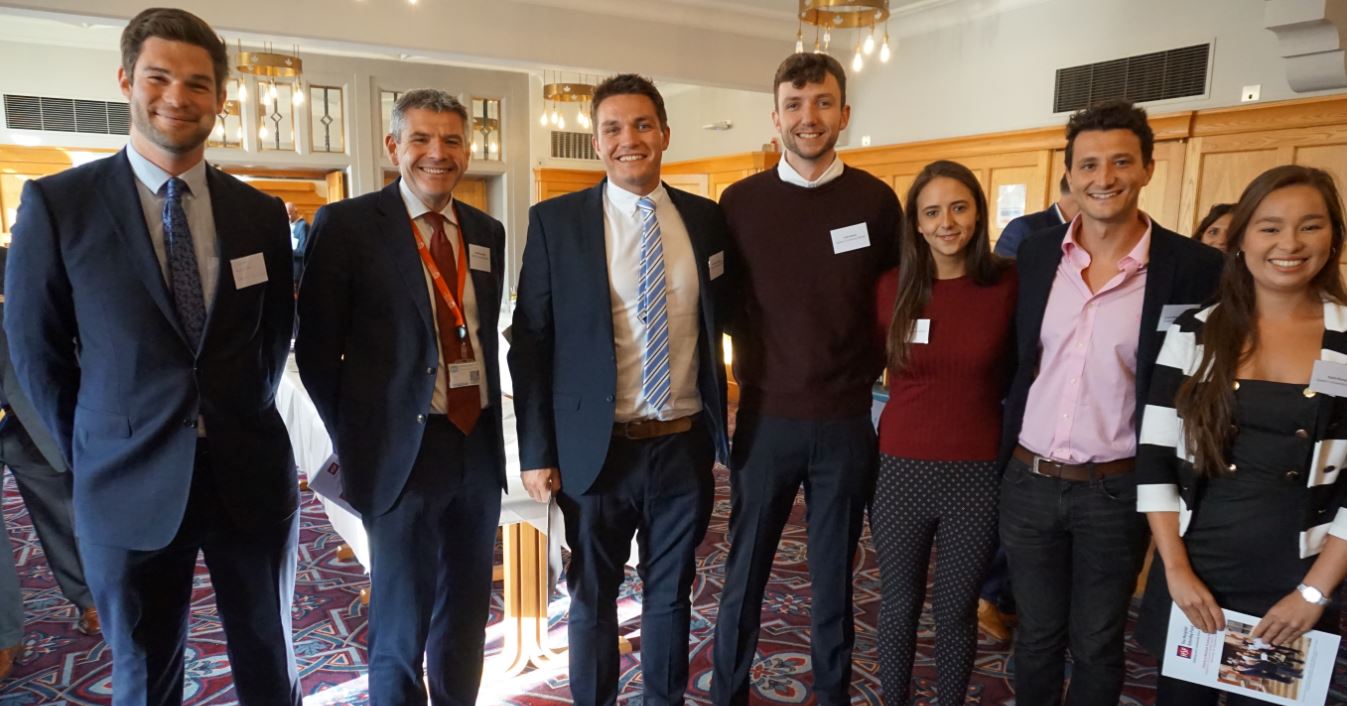HOSPITAL SATURDAY FUND – SUPPORTING MEDICAL ELECTIVES 
06 September 2019
Hospital Saturday Fund (HSF) Chairman John Greenwood, and Chief Executive Paul Jackson, were part of a delegation from HSF who made a return visit to Queen’s University this week to mark the role of the Fund in supporting local medical initiatives and to issue the latest grant cheques.
The event, which took place on Wednesday 4 September in the Canada Room at the University, was also attended by Dr Neil Kennedy, Director of the Centre for Medical Education in the School of Medicine, Dentistry and Biomedical Sciences at the University, and by six of the ten Queen’s students who had recently returned from their overseas electives, thanks to HSF support.
The reception was an informal opportunity for the students to update HSF staff on how they put Fund support to good use over the summer in countries which included Cambodia, Vietnam and Australia, and to hear about local Northern Ireland projects also receiving HSF funding.
Calum Simpson spent a total of six weeks in Perth, Australia – two with the Royal Flying Doctor Service (RFDS) and the remainder with the Ambulance Service. “It was an amazing experience,” said Callum, “and one that I certainly wouldn’t have been able to do without HSF funding.”
During the fortnight with the RFDS, Calum joined doctors on 25 flights to various locations in Western Australia. “One of the great things was flying into the outback with the Flying Doctors, helping very remote communities. There were a lot of cardiovascular disease and trauma patients to see, health inequality-related issues such as mental health to attend to and inter-hospital transfers to facilitate.
HSF funding helps with some of the core costs of placements, which may otherwise prevent students from choosing a placement overseas. For Calum it was with practical day-to-day matters, such as getting to and from his placement. “It was a great experience setting me up for final year and then onto into foundation programme after graduation,” he added.
HSF funding not only enables Queen’s medical students to conduct their medical electives overseas but it also allows them to travel to remote places, entrench themselves in the local culture, and access safe accommodation.
The opportunity to conduct electives overseas also helps the University to establish new links with other institutions across the world, creating future elective options for students to broaden their horizons, shape potential career paths, and gain invaluable life experiences.
Speaking ahead of the reception about the importance of HSF support, Dr Kennedy said: “The Hospital Saturday Fund’s support was vital in helping making an overseas placement viable. It allowed our students to extend their clinical knowledge and skill set, explore particular medical specialisms in a different healthcare setting and develop cultural competence.
“The experience they have gained from an overseas medical elective is invaluable as it has provided them with unique insights and comparative perspectives on national and international medical practice.”
Simon Feist-Wilson visited a rural hospital in Eswatni (aka Swaziland) on his four-week elective, where he was primarily engaged in general surgery. With high levels of impoverishment among the public, and low standards of basic health care available, Simon said the experience was a huge departure from what patients in the UK would expect. And for him, the takeaway from his trip was more fundamental.
“Maybe we don’t know how lucky we are to have the NHS. Everyone in Swaziland has to pay for something.
“Medically what I learned was limited, but what I did find out was that patients there present with many of the same complaints and diseases as people in the West. The major difference is that, given the very low standard of education, patients there didn’t know why they were presenting with Type 2 diabetes or whatever, or what they could do to prevent it.
“The world is becoming a much smaller place. If one is of the mind-set of treating a patient solely in a ‘Western way’ then you are going to come a cropper. HSF helps medical students to expect the unexpected, and to find out about other approaches to medicine and treatment, and that is invaluable.”
A medical elective is a compulsory attachment, with 4th year medical students not permitted to progress to final year without the satisfactory completion of the six week elective module, which commences at the end of June and runs until the start of August. Every year, 240-275 Queen’s students undertake a medical elective, gaining essential skills and perspective on national and international healthcare practices.
The HSF is a UK/Ireland organisation which was established in 1873. A leader in the health insurance market, all profits from their health plan product goes to charity, including medical electives. As a registered charity HSF provides financial assistance in a variety of areas, such as hospitals, hospices, medical organisations and also supports medical training within the United Kingdom, Isle of Man, Channel Islands and Ireland.
Representing the HSF on the Fund’s third visit to Queen’s this year (the first being in April, the second in June) were: John Greenwood (Chairman); Paul Jackson, (Chief Executive); Dave Thomas (Vice Chairman); John Randel (Chairman of HSF Health Plan) and Margaret Rogers (Vice Chair of the Fund’s Grant Making Committee).
To find out about supporting medical research or scholarships at Queen’s visit the Development and Alumni Relations Office website or contact Teresa Sloan, Head of Health Fundraising, telephone +44 (0)28 9097 5394.
For general enquiries about this story contact Paddy Gilmore (Trusts and Foundations Officer); to submit graduate news items, please get in touch with Gerry Power, Communications Officer, Development and Alumni Relations Office, Queen's University Belfast or telephone: +44 (0)28 9097 5321.
Caption: Among those from Queen’s University present at the HSF reception were (L-R): Calum Simpson (who went to Perth, Australia); Dr Neil Kennedy; Simon Feist-Wilson (Swaziland); Colin Burke (Ecuador/Peru); Amy Ross (Vietnam); Louis-Philippe Delaugere (Cambodia) and Katie Khong (who visited Cambodia).
Back to Main News
Top of Page